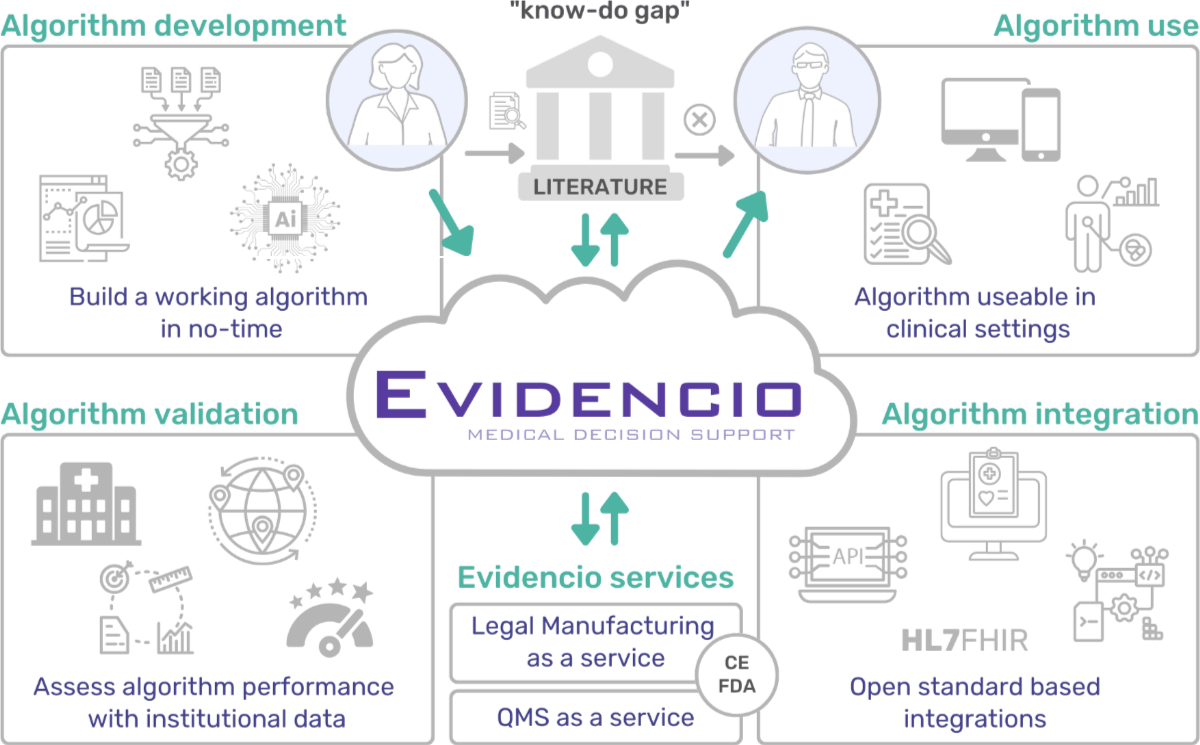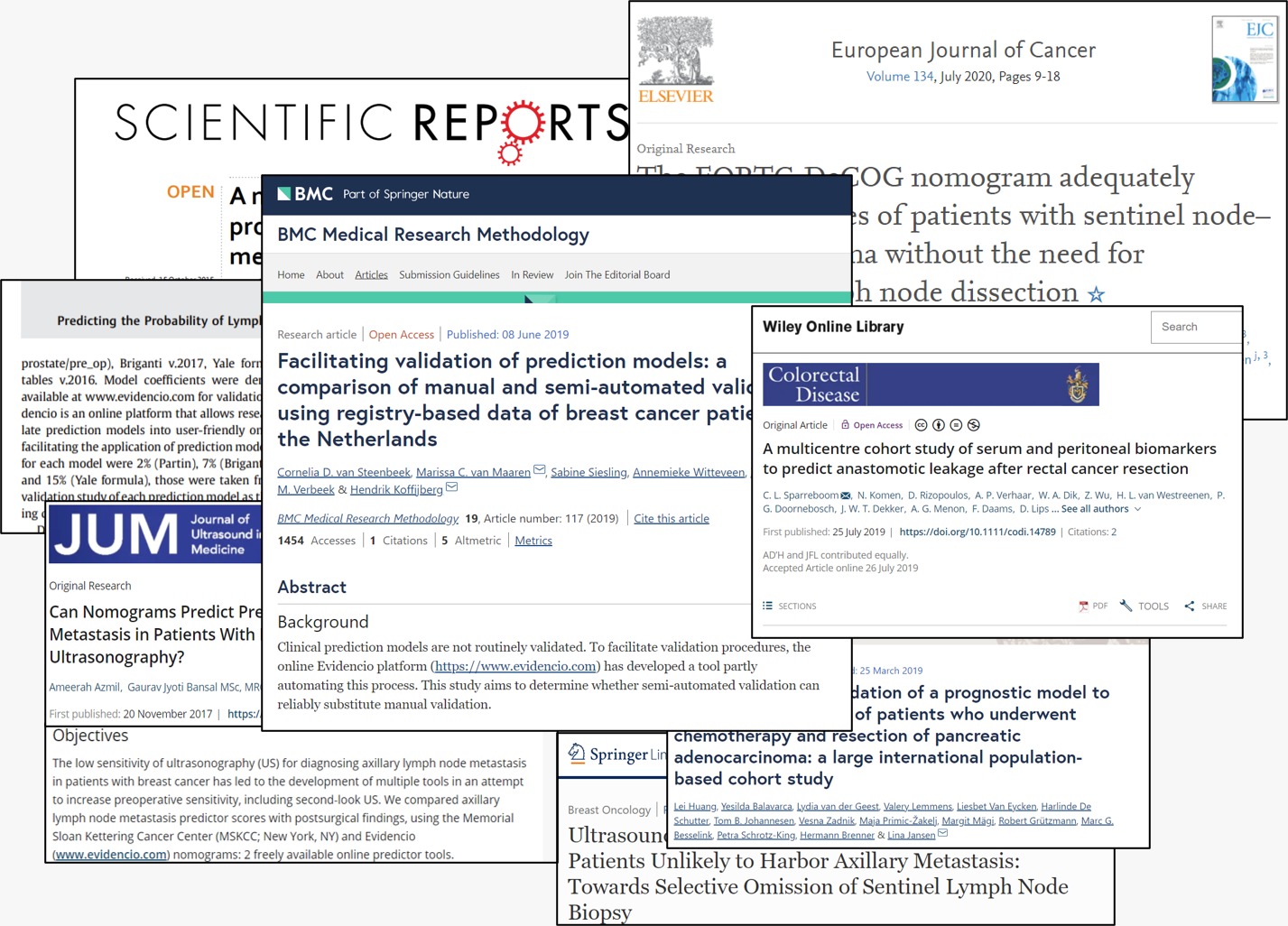About
Introducing the Evidencio Platform
Algorithm Library
Evidencio hosts a library with more than 4000 medical algorithms. You can configure, publish, use and share your algorithms on Evidencio for free.

Use Algorithms
You can use your own algorithms, all public algorithms or any algorithms that have been shared with you by other Evidencio users for free as long as you respect our free and fair use policy.
The Evidencio platform is free to use for personal and academic use. We've developed the Evidencio platform based on the idea that it can be delivered as a free service, as long as your use of our services isn't on behalf of any third party, intended to provide a service or make money. In other words, you're more than welcome to use our services for free, for your own personal, academic or other non-commercial use.
More information on free and commercial use, features and pricing can be found here .

Configure & Implement Algorithms

The Evidencio platform offers standardized tools that help you configure your algorithm as an online tool. You can easily describe your algorithm’s capabilities, classify it in its medical context and elaborate on your algorithm’s underlying research and evidence. The platform lets you define the algorithm parameters, algorithm logic and output. Evidencio offers predefined logic for the most common multivariable statistical algorithms (e.g. linear regression, logistic regression, cox regression).
In addition to the standard calculation formats, Evidencio offers a wysiwyg / drag & drop formula tools with which you can easily define your algorithm as a custom mathematical expression.
Evidencio can also parse and run your algorithm as an R-script, as a broadly used mathematical algorithm language. Of course we'd like to see new algorithms enter the public domain on the Evidencio platform, either as free algorithms or as licensed content. When made available as licensed content, an algorithm is available to subscription users only, and thus generates a royalty based revenue for the algorithm owner.
Evidencio in literature
More and more researchers are discovering the value of including Evidencio in their publications. Here is a list of articles that reference an algorithm on Evidencio as part of the publication. As such, research output becomes usable, interpretable, and testable.
Publish Algorithms
Once you’ve defined and implemented your algorithm on Evidencio it's ready for use. As an algorithm author you can decide who can access and use your algorithm. You can opt retain your algorithm as a private algorithm, or you can share it with your team, fellow researchers, or reviewers.
If you want to open your algorithm to the world you can opt to publish the algorithm as a public algorithm on Evidencio. Before a an algorithm is published as a public algorithm it will be reviewed by our staff to assure that it meets a set of minimal quality standards (on e.g. completeness, correctness and claims)

Medical device certification
Unlock the Future of Healthcare with Evidencio's Medical Algorithm Certification
Find in Evidencio your trusted supplier
Enabling clinical use of AI Algorithms as certified Medical Devices
Software as a Medical Device with Evidencio
In the rapidly advancing field of medical technology, ensuring the safety, efficacy, and compliance of your medical algorithms is paramount. Evidencio specializes in certifying medical algorithms as medical devices, resulting in Software as Medical device (SaMD), giving you the necessary credentials to excel in the competitive healthcare market.
Discover the Future of Healthcare with the Evidencio Algorithm Medical Device Library
Your Trusted Source for Clinical and Medical Algorithms
The Evidencio Medical Device Library – the premier destination for cutting-edge, CE-marked medical algorithms. Designed for hospitals, healthcare professionals, and independent software vendors (ISVs), the Evidencio Medical Device Library offers a diverse range of stable, user-friendly algorithms that can be accessed via our robust platform, as standard web-based solutions, or seamlessly integrated into electronic medical records (EMRs). The Evidencio Algorithm Medical Device Library caters to both algorithm IP-holders, as well as, Professional Algorithm users.
Our mission
At Evidencio, we strongly believe that prediction algorithms can complement human clinical decision-making and assist healthcare professionals in making patient-tailored evidence-based decisions. It is our mission to support the transition of these clinical prediction algorithms from research into everyday medical practice.
To reach our goal, we are building a platform and research community which together provide a dynamic, high-quality, and transparent library filled with clinically relevant prediction algorithms.
Evidencio aspires to
- Create one centralized platform for clinical prediction algorithms and calculators.
- Let users add algorithms based on their own (institutional) data.
- Facilitate external validation of new and existing algorithms.
- Achieve maximum transparency.
- Facilitate communication between researchers/peers worldwide.
- Provide quality rating systems and processes.
- Provide evidence-based input to support medical decisions.
- Integrate prediction algorithms in guidelines, process applications and EHR's/EPR's.
Members of the online research community get full access to published algorithms and the Evidencio platform.
The Evidencio Platform is intended for use in medical research, as well as every day medical practice. Online prediction algorithms are made available through the Evidencio web-app, as well as through our API for use in third party applications, EHR's, and decision support tools.
Evidencio's information security management system is ISO27001 and NEN7510 certified. Evidencio's quality management system is ISO13485 certified.
Background
In the last few decades, the volume of scientific papers has increased exponentially. The resulting 'big data' pool houses an enormous potential, but is still only marginally used in medical practice. The World Health Organization (WHO) has acknowledged this disconnect between science and medical practice as the "know-do gap". Improvement of knowledge extraction, validation, and transferal is essential in order to utilize the untapped potential of medical databases such as PubMed and EMBASE. It was this insight that moved the developers of Evidencio to found the online research community Evidencio in 2015.
In addition to scientific papers, the number of published medical prediction algorithms also steeply increased over the years. Prediction algorithms are research-based tools that assist healthcare professionals in making evidence-based medical decisions and are a powerful way to translate scientific literature into medical practice. When appropriately developed and validated, prediction algorithms have inherent advantages over human clinical decision making alone. Firstly, the statistical algorithms can accommodate many more factors than the human brain is capable of taking into consideration. Secondly, if given identical data, a statistical algorithm will always give the same result whereas human clinical judgment has been shown to result in both inconsistency and disparity, especially with less experienced clinicians. Thirdly, and perhaps most importantly, several prediction algorithms have been shown to be more accurate than clinical judgment alone.
Prediction algorithms can be applied in various settings, for example to describe the likelihood of the presence or absence of a certain condition, assist in determining patient prognosis, and help classify patients for treatment. The use of prediction algorithms not only eliminates the distorting effect of subjectivity, but also sets the stage for true informed consent and shared decision-making. In addition, several clinical studies have shown that the use of prediction algorithms leads to shorter hospital stays, fewer complications, cost savings, and a better allocation of scarce resources.
Please note: Although the added value of medical prediction algorithms is obvious, these algorithms are not a replacement for clinical judgment and should complement rather than supplant clinical opinion and intuition.

